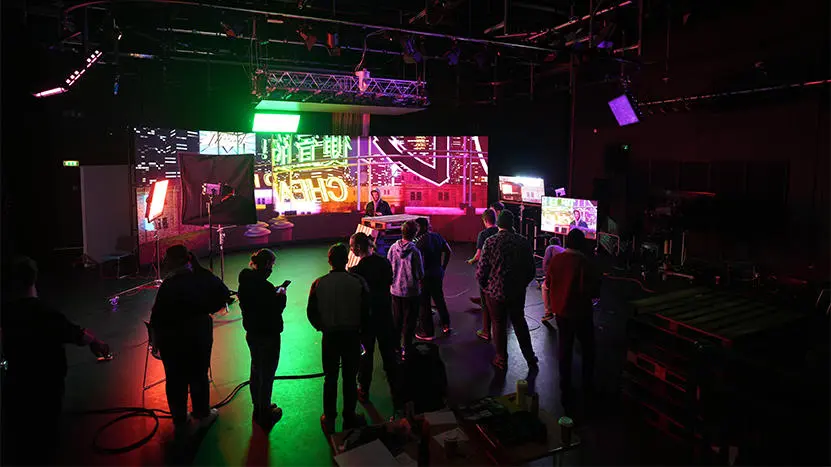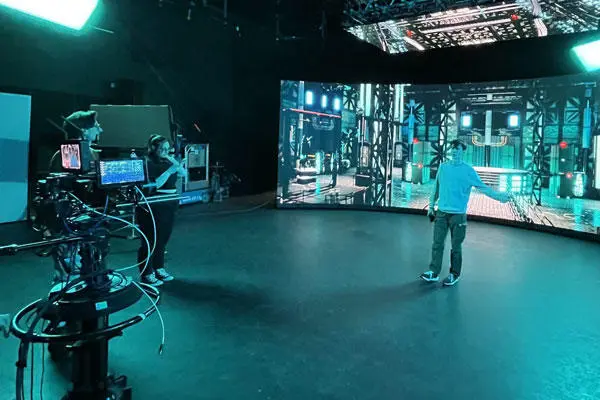
MA Film Production
Got a passion for filmmaking? Want to improve your professional showreel and boost your employability? Solent’s MA Film Production programme is ideally suited to students who...

Unleash your creativity with a TV and film career. Learn from industry experts in professional-grade facilities, and join our internationally successful graduates at the BBC, Sky, Disney and beyond.
With its unique blend of creative practice and critical studies, Solent’s highly regarded film and television undergraduate degree equips you with the production experience, creative skills and critical thinking necessary to help you understand the global film and television industries – as well as your place within it.
This degree is a great choice for students who aspire to work in, or alongside, the film and television industries – providing you with the necessary training and education to ensure that you are ready for the ever-evolving world of film and television production, distribution and exhibition.
During the first year, you will study modules that address the building blocks of screen language, genre analysis, screenwriting and production management, working on individual projects as well as collaborating in groups to make short films and television content.
In the second year, you will interrogate the relationship between representation and identity through screen criticism and in practice, across fiction and documentary, looking at the role of audiences in film and television consumption and considering creative approaches to short film design.
During the final year, you will explore career pathways with modules designed to focus on enhancing employability and transferable skills as well as the evolving globalised nature of production, distribution and exhibition practices. These modules will be accompanied by one-to-one supervision of your final year project.
Throughout your studies you will have access to the University’s media academy, featuring cutting-edge production equipment, studio facilities and edit suites.
Taught by experts whose specialisms range from directing, producing and screenwriting – as well as researchers who explore the changing world of screen industries – you will have the opportunity to benefit from a range of real-world learning opportunities such as workshops and masterclasses led by visiting media professionals; previous guest speakers have included high profile visitors such as Mark Gatiss (Sherlock, Doctor Who, The League of Gentlemen, Game of Thrones) and Jed Mercurio (Line of Duty, Bodyguard), who have offered advice on working in the industry – as well as other working professionals in film and television production, including Solent graduates.
Our graduates’ success speaks for itself; Solent film and television alumni have gone on to work as videographers, film and digital content developers, production assistants, programme schedulers, researchers, editors and directors, as well as in other creative areas such as gaming, marketing, graphic design, publishing, PR, advertising and events management. A number of our students have also set up their own film production companies or become successful freelancers.
Certified by:

Accredited by:

Educational partner:

Contact international admissions
Email: Call:Our creative degrees allow our students to develop a critical eye for design with a knowledge of different design approaches and problem solving techniques. Take a look at some of the great work they produce.

If you're not quite ready for a full undergraduate degree, there's alternative entry through one of our foundation years
This course has access to specialist facilities
If you have an appropriate Level 5 qualification, you can top it up to a degree in just a year
After successfully completing your studies, there's an opportunity to continue your studies at Solent
You have the opportunity to study abroad in one of our partner universities for a semester on this course
Solent's film and television degree is ideally suited to students who are passionate about film and television and want to become well equipped with the critical, practical, technical and creative skills that span both subjects and industries.
Course graduates can pursue careers in a range of film, television and media production roles; or use their transferable skills to pursue roles in education, design, publishing, PR, marketing, advertising and events management, among others. Previous graduates have also gone on to set-up successful production companies or become freelancers.
Alumni have worked with a range of organisations including; BBC, ITV, Sky, Warner Bros, Disney, Ignition, Global Radio, Absolute Post, Fox, Channel 4, Optomen, JOE Media, Royal Caribbean Cruises, Premier League Productions, Microsoft and Digital Cinema Media.

Course Leader

Associate Professor of Screen Histories

Associate Professor of Performance, Sex and Gender

Senior Lecturer

Senior Lecturer

Senior Lecturer

Senior Lecturer

Lecturer

Lecturer

Lecturer
The University cannot guarantee any particular members of staff will teach specific aspects of the course in the future, but will endeavour to ensure the teaching team maintains their balance of experience and qualifications.
During your studies, you'll have access to several specialist production spaces, including a large TV studio with audience seating for up to 200, an acoustically treated film studio that can be reconfigured for set building and filming, and an immersive filming area equipped with green screen technology.
These dedicated studios feature multi-camera setups with broadcast-standard equipment, including one of the largest HD facilities in the south of England. The variety of post-production spaces and specialist edit booths are connected to a high-speed fibre network and include Mac Pro computers, complemented by a range of radio and music production facilities. Additionally, Solent boasts a digital 3D cinema with a professional 2K projector and Dolby Atmos sound system. Once trained, you will have the opportunity to book and hire equipment through our specialist media production store.
Broaden your horizons by adding an international dimension to your CV – essential to achieving success in today’s fast-changing, global environment.
Studying, working or volunteering in another country could be the experience of a lifetime. Enhance your degree by developing important global skills such as knowledge of other countries, language skills, intercultural awareness, adaptability and confidence.
For more information, please email international.mobility@solent.ac.uk.

This module is clearly situated in a discussion of the modern-day arenas of filmmaking and television production, through a critical analysis of topics including blockbuster films and rivals to established television habits, such as Netflix.
This module will introduce students to some of the dominant styles and strategies of documentary storytelling. It will consider documentary’s various modes as well as the diverse and distinctive approaches filmmakers adopt when recording people, stories and events from the world on film.
This module introduces you to key concepts and training relating to visual storytelling in single camera fiction production. You will understand and acquire the practical, technical and creative skills that will lead to the creation of your own short film.
Film and television have their own language, this module will give you the tools to deconstruct this language and critically consider formal properties of the screen, including camera, framing and movement, lighting and colour, sound and editing, acting and performance.
On this module you will learn the basics of screenwriting and get a solid foundation in narrative structure, as well as a good understanding of how themes, characters, subtext and dialogue all interweave on the page in order to create a blueprint for a film.
Now that you have a good grasp of the fundamentals of single camera visual storytelling, you will take the production skills you have started to develop into the controlled environment of the studio.
Solent’s curriculum framework builds on our unique, creative and applied approach to teaching. The transformation of students’ lives is at the heart of our mission as a university, and our curriculum – informed by the latest theory – reflects this shared educational vision.
Find out more
The student achievement team are on hand to help you succeed during your studies at Solent. They aim to contact you at key times during your time here with personalised information, advice and guidance, by email or phone.
The disability advice team provides information, advice and guidance for disabled students.
All students can access Succeed@Solent, Solent's online guide to getting better grades. It offers extensive, practical information and advice on topics such as academic writing, research and presentations.
Spend on UK film and high-end TV production was £4.23bn in 2023, of which, £2.87bn was invested in 187 high-end television production (HETV) shows and £1.36bn was spend on producing 207 feature films. With a strong creative industry there are wide ranging roles in film and television and beyond, including camera operator, editor, producer, vision mixer, location manager, researcher, script writer and more.
With an academic team made up of active filmmakers and creative practitioners, at Solent you can access a wealth of experience and build networks by working on live client briefs both within and beyond the curriculum.
There is also a visiting speaker and masterclass programme from a diverse number of industry guests, and recent speakers have included; Maisie Williams (Game of Thrones), Paul Franklin (Batman Begins, Inception), Terry Rawlings (Alien, Blade Runner), Jan Harlan (The Shining, Full Metal Jacket), Walter Murch (Apocalypse Now, The Godfather Trilogy), Michael Apted (The World is Not Enough, Masters of Sex), Mike Hodges (Get Carter, Croupier), Fay Rusling (Green Wing, Smack the Pony), Dave Calhoun (Time Out).
Over 250 students and graduates have also had their work (writing, video essays, photography) published in Diegesis magazine, which is produced by staff and students in the film department, and published in print and online.

Per day: £230 to £360
For a camera assistant, Bectu recommends a day rate of between £230 and £360, depending on the type of television programme, based on a nine-hour day, plus a one-hour break for lunch. For a studio cameraperson, the recommended day rate rises to £325 for 9 hours, plus lunch, and £415 for 11 hours, plus lunch. On major motion pictures camera operators earn a day rate of £723 for 10 hours, plus lunch and £831 for 11 hours, plus lunch.
Starting salary: £18,000 to £25,000
Starting salaries for assistant editors employed by a television or post-production studio are in the region of £18,000 to £25,000. With experience as a film or video editor, you could earn £21,000 to £35,000. At a senior level, your earnings could potentially reach £37,000 to £70,000, but the higher end of this scale is only available to senior editors working on big-budget projects.
Per hour: £22 to £28
Many television production coordinators are freelance and are paid on a contract basis. Rates depend on the type of production and its budget, with pay at a suggested £22 to £28 hourly rate by the Broadcasting Entertainment Cinematograph and Theatre Union (BECTU). According to the Televisual Salary Survey 2017, the average salary for production coordinators is £30,600.
The stated salaries are published on prospects.ac.uk. Income figures are intended as a guide only.
The Solent Careers team is committed to getting students into great careers.
While you are studying, the team can help you with finding work experience or placements, link you with a mentor, check your CV, or offer one-to-one guidance.
If you're in your final year, we also have graduate job opportunities just for Solent graduates.

6th
UK uni for sustained employment
Longitudinal Educational Outcomes, 2022
Certified by:

Accredited by:

Educational partner:

Every student at Solent University will also have the option to study an additional Certificate in Practical Artificial Intelligence qualification alongside their course. Free of charge, the course ensures you'll be prepared for a fantastic and varied career after graduation.


Thinking about studying further than an undergraduate degree? Alumni can get 20% off their postgraduate study.

Got a passion for filmmaking? Want to improve your professional showreel and boost your employability? Solent’s MA Film Production programme is ideally suited to students who...

Do you have an eye for design? Would you like to help influence the future of visual communications? Our MA Visual Communication degree is ideal for creatives keen to refine their practice, working as part of an interdisciplinary group of students.

Explore, experiment and learn the industry skills to become a trailblazer in virtual production (VP) and extended reality (XR) using Solent's VP volume, XR green screen studio, Vicon mocap, and body scanner.
The tuition fees for the 2025/26 academic year are:
For further information, please visit our tuition fees page.
While most course costs are covered by your tuition fees, some essential resources and optional extras may need to be paid for separately. These additional costs are listed below. For advice on budgeting and managing your money, please contact student.funding@solent.ac.uk.
The 2025/26 other costs are:
Compulsory costs
Students may be required to self-finance up to £300 for their final major project film or TV productions. Students choosing to raise a budget for their productions are encouraged to crowdfund and seek advice from project supervisors on budgetary matters where applicable. Financial assistance is available for students facing financial difficulties and will be determined based on their individual situation through an eligibility assessment.
Optional costs
The course features optional trips to international film festivals. These trips are subject to student demand. Prices will be dependent on the location of the trip as well as the travel and accommodation costs at the time of booking.
Solent University offers a range of bursaries and scholarships that provide financial assistance or waive fees for tuition or accommodation. Each bursary or scholarship has specific eligibility criteria. Check out our bursaries and scholarships pages to find out more.
Solent EU Welcome Scholarship (Fee Discount)
This scholarship is available to students from an EU country, with EU nationality, who are applying for an undergraduate course starting in September 2025. The scholarship will reduce your tuition fees to £10,500 per year - this includes foundation years.
Find out more about the scholarship
Cost of living support
At Solent, we understand that the cost of living crisis may be of some concern. To help, we've put together some detailed information to show what support is available and how to make your money go further.
There is no charge to attend graduation, but you will be required to pay for the rental of your academic gown (approximately £45 per graduate, depending on your award). You may also wish to purchase official photography packages, which range in price from £15 to £200+. Graduation is not compulsory, so if you prefer to have your award sent to you, there is no cost. Extra guest tickets will go on sale after results publication and will be sold on a first-come-first-served basis. The cost per ticket is currently £15. Please note, we do not guarantee there will be any extra tickets available to purchase.
Please select an option below:
As a general guide, we look for qualifications that are equivalent to the British high school A-levels.
If you are applying from outside the UK, find information about entry requirements, visas and agents for your country here.
For further information about EU qualifications, please see our course entry requirements document.
For international students who do not meet the direct entry requirements for this undergraduate degree, our trusted partner, QA Higher Education offers the following pathway programme designed to develop your academic and English language skills:
As a general guide, we look for qualifications that are equivalent to the British high school A-levels.
If you are applying from outside the UK, find information about entry requirements, visas and agents for your country here.
For further information about international qualifications, please see our course entry requirements document.
For international students who do not meet the direct entry requirements for this undergraduate degree, our trusted partner, QA Higher Education offers the following pathway programme designed to develop your academic and English language skills:
All international applicants need to be aware that the English language requirements to attend Solent University, and the English language requirements to obtain a visa from the Home Office, may be different. This means that if you meet the Solent University language requirement to gain a place on the course, you may still have to meet additional requirements to be granted with a visa by the Home Office.
We strongly advise all applicants to visit the Home Office website which outlines all the requirements for a successful visa application.
Contact international admissions
Email: Call:Full-time
Any student applying for the first year of a full-time/sandwich undergraduate course must apply through UCAS (University and Colleges Admissions Service). This includes mature, overseas and EU students.
Nearly all schools and colleges offer their students the facility of applying electronically through the UCAS website using 'Apply'; it may also be used by those applying independently in the UK and overseas. This facility and all course information can be found on the UCAS website: www.ucas.com.
Your application should reach UCAS by 31 January if you hope to enter a course the following autumn. Early application is advised for the most popular subject areas. Late applications may be made until the end of June. The UCAS Code for the University is S30, code name SOLNT.
Find out what happens after you apply
Contextual offers
Solent endeavours to offer learning opportunities to students from all backgrounds. When we receive and review an application, we take into consideration the context and personal circumstances of applicants when making a decision, which means our advertised entry tariff could be reduced.
Top-up route:
We welcome applications from students currently studying a Foundation Degree, DipHE, HNC, HND or modules of an undergraduate degree course at another university, who wish to enter directly into Years 2 or 3 of one of our undergraduate degree courses. Please contact our admissions team for more information: contact us
Applicants who do not have English as their first language will be required to demonstrate an approved level of proficiency in the use of the English language. The agreed minimum requirements for this course are:
Qualifications are checked before enrolment, and international students must bring their original certificates or certified copies when coming to study at the University.
Pre-Sessional English programme
The University also offers a pre-sessional English programme for international students who wish to improve their level of English before starting a degree course.


